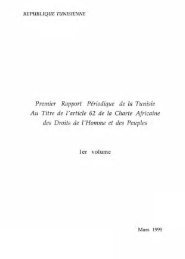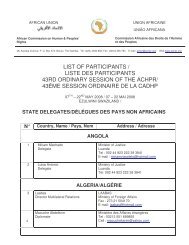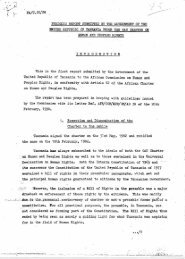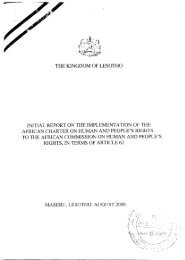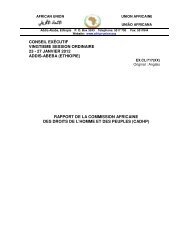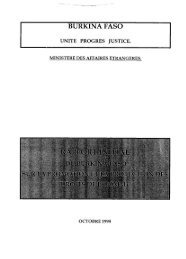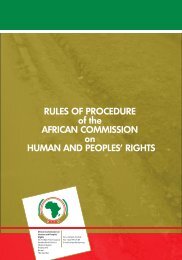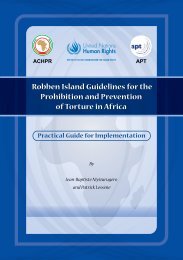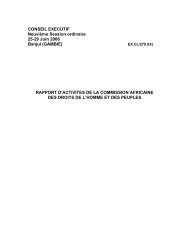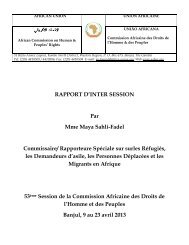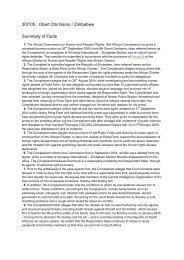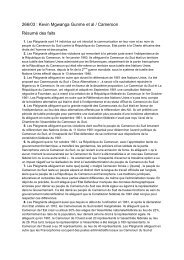Report on ghana's compliance with its reporting - African ...
Report on ghana's compliance with its reporting - African ...
Report on ghana's compliance with its reporting - African ...
You also want an ePaper? Increase the reach of your titles
YUMPU automatically turns print PDFs into web optimized ePapers that Google loves.
t<br />
REPORT ON<br />
GHANA'S COMPLIANCE WITH ITS REPORTING OBLIGATIONS<br />
PURSUANT TO ARTICLE 62 OF THE<br />
AFRICAN CHARTER ON HUMAN AND PEOPLES' RIGHTS<br />
BACKGROUND<br />
Ghana gained independence from British col<strong>on</strong>ial rule in March 1957. The<br />
country has experienced several military coups and civilian governments.<br />
Ghana is a unitary state <strong>with</strong> a presidential system of government. The<br />
country is divided into 10 administrative regi<strong>on</strong>s.<br />
Ghana covers an area of about 238,537 square kilometers (92,100 square<br />
miles). It is situated in West Africa and bounded <strong>on</strong> the North by<br />
Burkina Faso, <strong>on</strong> the East by Togo, <strong>on</strong> West by La Cote d'Ivoire and <strong>on</strong> the<br />
South by the Atlantic Ocean. It has a coastline of 350 miles. The<br />
largest man-made lake in the world was created <strong>on</strong> the River Volta, which<br />
flows through and joins the sea in Ghana.<br />
The populati<strong>on</strong> of Ghana as at the last populati<strong>on</strong> census in 1984 was<br />
13.54 milli<strong>on</strong> <strong>with</strong> an annual growth rate of about 3%. The populati<strong>on</strong> was<br />
estimated in January 1997 at 18.5 milli<strong>on</strong>. Accra is the capital of Ghana<br />
and has the largest populati<strong>on</strong> density of about 52 pers<strong>on</strong>s per square<br />
kilometers.<br />
In 1991, the military government of the erstwhile Provisi<strong>on</strong>al Nati<strong>on</strong>al<br />
Defence Council (PNDC), unveiled a transiti<strong>on</strong>al Programme to return<br />
Ghana to a c<strong>on</strong>stituti<strong>on</strong>al democracy. A Committee of Experts was<br />
appointed to prepare a draft c<strong>on</strong>stituti<strong>on</strong> for the administrati<strong>on</strong> of<br />
Ghana. A C<strong>on</strong>sultative Assembly was set up by PNDC Law 253 to c<strong>on</strong>sider<br />
the draft c<strong>on</strong>stituti<strong>on</strong>. In a referendum organized <strong>on</strong> 28th April 1992,<br />
the draft c<strong>on</strong>stituti<strong>on</strong> was adopted by Ghanaians. This marked the start<br />
of a new process toward an era of liberal democratic governance.<br />
In January 1993, Ghana returned to civilian c<strong>on</strong>stituti<strong>on</strong>al rule after<br />
eleven years of military rule. The restorati<strong>on</strong> of c<strong>on</strong>stituti<strong>on</strong>al<br />
government occasi<strong>on</strong>ed the birth of several democratic instituti<strong>on</strong>s.
Arms of Government<br />
The powers of governance are shared am<strong>on</strong>g the three principal organs of<br />
state, the Executive, the Legislature and the Judiciary, each of which is<br />
expected to be independent of the other and to serve as a check against<br />
any potential abuse of power.<br />
1. The Executive<br />
The 1992 C<strong>on</strong>stituti<strong>on</strong> provides for a presidential system of government.<br />
Article 58(1) of the C<strong>on</strong>stituti<strong>on</strong> vests executive authority of Ghana in<br />
the President and enjoins the incumbent to exercise those powers in<br />
accordance <strong>with</strong> the provisi<strong>on</strong>s of the C<strong>on</strong>stituti<strong>on</strong>.<br />
The primary functi<strong>on</strong>s of the President include executi<strong>on</strong> and<br />
maintenance of the C<strong>on</strong>stituti<strong>on</strong> and all laws made under or c<strong>on</strong>tinued in<br />
force by the C<strong>on</strong>stituti<strong>on</strong>. The President may exercise executive<br />
authority directly or through officers subordinate to him/her.<br />
Article 67 of the C<strong>on</strong>stituti<strong>on</strong> enjoins the President, at the beginning of<br />
each sessi<strong>on</strong> of Parliament and before a dissoluti<strong>on</strong> of Parliament, to<br />
deliver to Parliament an address <strong>on</strong> the state of the nati<strong>on</strong>.<br />
2. The Legislature<br />
The sovereign people of Ghana mandate their<br />
elected representative to go to Parliament and make<br />
laws for the effective administrati<strong>on</strong> of the Country<br />
There is a vibrant multi-party parliamentary democracy in Ghana, which<br />
has experienced two successful civilian nati<strong>on</strong>al electi<strong>on</strong>s and a number of<br />
peaceful bye-electi<strong>on</strong>s.<br />
Article 93 provides for an independent legislature, which shall exercise<br />
<strong>its</strong> power in accordance <strong>with</strong> the C<strong>on</strong>stituti<strong>on</strong>. Article 93 (1) of the<br />
C<strong>on</strong>stituti<strong>on</strong> provides for a Parliament which shall c<strong>on</strong>sist of not less than<br />
<strong>on</strong>e hundred and forty elected members. Article 93(2) provides that<br />
"subject to the provisi<strong>on</strong> of this C<strong>on</strong>stituti<strong>on</strong>, the legislative power of
Ghana shall be vested in Parliament and shall be exercised in accordance<br />
<strong>with</strong> the C<strong>on</strong>stituti<strong>on</strong>. "<br />
3<br />
The power of Parliament to make laws is exercised through bills which it<br />
passes, and which are assented to by the President. The Parliament has<br />
no power to pass any law that takes effect before the date of the making<br />
of the law if it imposes limitati<strong>on</strong>s <strong>on</strong> the pers<strong>on</strong>al rights and liberties of<br />
any pers<strong>on</strong>.<br />
3. The Judiciary<br />
To guarantee the rule (if law, Article 125 provides for an independent<br />
judiciary which shall be subject <strong>on</strong>ly to the C<strong>on</strong>stituti<strong>on</strong> and neither the<br />
executive nor the legislature shall have or be given final judicial power.<br />
The equality of all Pers<strong>on</strong>s before the law and their<br />
freedom of enforce their rights and liberties in a court<br />
a law is guaranteed under the c<strong>on</strong>stituti<strong>on</strong>.<br />
The independence of the Judiciary from the Executive<br />
and the Legislature is entrenched in the c<strong>on</strong>stituti<strong>on</strong>.<br />
The Judiciary shall be accountable to the c<strong>on</strong>stituti<strong>on</strong><br />
and the people<br />
In exercise of <strong>its</strong> judicic...{ power, the judiciary shall have jurisdicti<strong>on</strong> in all<br />
matters civil and criminal, including matters relating to the C<strong>on</strong>stituti<strong>on</strong><br />
and such other jurisdicti<strong>on</strong> as Parliament may, by law, c<strong>on</strong>fer <strong>on</strong> it.<br />
The top hierarchy of the judiciary is the Supreme Court which has<br />
exclusive jurisdicti<strong>on</strong> in:<br />
"all matters relating to the enforcement or interpretati<strong>on</strong> of [the]<br />
C<strong>on</strong>stituti<strong>on</strong>; and<br />
all matters arising as to whether an enactment was made in excess of the<br />
powers c<strong>on</strong>ferred <strong>on</strong> Parliament or any other authority or pers<strong>on</strong> by law<br />
or under [the] C<strong>on</strong>stituti<strong>on</strong>".
The powers and functi<strong>on</strong>s of the judiciary may be described as follows.<br />
1. The Judiciary is the branch of government given authority to<br />
interpret, apply and enforce the laws of Ghana.<br />
2. It shall be made up of the Supreme Court, the Court of Appeal, High<br />
Court and Regi<strong>on</strong>al Tribunals, and such Lower Courts and Tribunals as<br />
Parliament may establish.<br />
3. The Courts and Public Tribunals form <strong>on</strong>e structure headed by the<br />
Chief Justice.<br />
4. The Supreme Cour; is given power as the highest authority to<br />
interpret the c<strong>on</strong>stituti<strong>on</strong>.<br />
5. The Supreme Court shall have the final authority to say what the law<br />
is including determining whether any acts of Parliament or President<br />
comply <strong>with</strong> the c<strong>on</strong>stituti<strong>on</strong>. The High Court shall also have the<br />
power to enforce the Fundamental Human Rights and Freedoms under<br />
the c<strong>on</strong>stituti<strong>on</strong>.<br />
6. All citizens as guardians of the c<strong>on</strong>stituti<strong>on</strong> have the right of<br />
unimpeded access to the courts to challenge any acts of the<br />
President, Parliament or any other body, public or private, which are<br />
inc<strong>on</strong>sistent <strong>with</strong> the provisi<strong>on</strong>s of the C<strong>on</strong>stituti<strong>on</strong>.<br />
7. In furtherance of the principle of independence of the Judiciary<br />
from both Parliament and the President, the financial administrati<strong>on</strong><br />
of the Judiciary shall be independent of executive c<strong>on</strong>trol and shall<br />
be subject to annual expenditure approvals by Parliament.<br />
8. Citizens may exercise popular participati<strong>on</strong> in the administrati<strong>on</strong> of<br />
justice through the instituti<strong>on</strong> of public and customary tribunals and<br />
the jury and assessor system.<br />
9. In order to safeguard the principle of the judiciary, the financial<br />
independence, a pustice of the Superior court or a chairman of the<br />
Tribunal or a Judicial office shall not be removed from office except<br />
for stated misbehajour or incompetence or <strong>on</strong> ground of inability to<br />
perform the functi<strong>on</strong>s of his office arising from infirmity of body or<br />
mind.
MEASURES (INCLUDI JG LEGISLATION OR POLICY) TAKEN BY<br />
GHANA TO IMPLEMENT THE PROVISIONS OF THE CHARTER<br />
CIVIL AND POLITICAL RIGHTS<br />
Articles 2 and 3 of the <strong>African</strong> Charter<br />
Article 2<br />
Every individual shall be entitled to the enjoyment of the rights and<br />
freedoms recognised and guaranteed in the present charter <strong>with</strong>out<br />
distincti<strong>on</strong> of any kind such as race, ethnic group, colour, sex, language,<br />
religi<strong>on</strong>, political or any other opini<strong>on</strong>, nati<strong>on</strong>al and social origin, fortune,<br />
birth or other status.<br />
Article 3<br />
1 Every individual shall be equal before the law<br />
2. Every individual shall be entitled to equal protecti<strong>on</strong> of the law.<br />
THE GHANAIAN CONSTITUTION<br />
Article 12 of the 1992 C<strong>on</strong>stituti<strong>on</strong> provides:<br />
1. The fundamental human rights and freedoms enshrined in this chapter<br />
shall be respected and upheld by the Executive, Legislature and<br />
Judiciary and all other organs of government and <strong>its</strong> agencies and,<br />
where applicable to them, by all natural and legal pers<strong>on</strong>s in Ghana, and<br />
shall be enforceable by the courts as provided by the C<strong>on</strong>stituti<strong>on</strong>.<br />
2. Every pers<strong>on</strong> in Ghana, whatever his race, place of origin, political<br />
opini<strong>on</strong>, colour, religi<strong>on</strong>, creed or gender shall be entitled to the<br />
fundamental human rights and freedoms of the individual (c<strong>on</strong>tained in<br />
this chapter) but subject to respect for the rights and freedoms.
6<br />
Article 17 of the C<strong>on</strong>stituti<strong>on</strong> provides:<br />
1. The dignity of all pers<strong>on</strong>s shall be inviolable.<br />
2. No pers<strong>on</strong> shall, whether or not he is arrested, restricted or detained,<br />
be subject to:<br />
a. torture or other cruel, inhuman or degrading treatment or<br />
punishment;<br />
b. any other c<strong>on</strong>diti<strong>on</strong> that detracts or is likely to detract from his<br />
dignity and worth as a human being.<br />
Article 17 of the C<strong>on</strong>stituti<strong>on</strong> provides:<br />
1. All pers<strong>on</strong>s shall be equal before the law<br />
B. LEGISLATION AND POLICY<br />
Public Order Act, 1994 (Act 491)<br />
The Public Order Act abolished the permit system, which previously<br />
restricted the right to dem<strong>on</strong>strate or picket in protest against<br />
particular policies of government that might be deemed inimical to public<br />
interest.<br />
Directive Principles of State Policy<br />
In additi<strong>on</strong> to the foregoing, the 1992 C<strong>on</strong>stituti<strong>on</strong> also c<strong>on</strong>tains a<br />
cardinal statement of nati<strong>on</strong>al values, which are intended to guide the<br />
c<strong>on</strong>duct of all citizens and authorities in Ghana. These values are found in<br />
Article 34 of the C<strong>on</strong>stituti<strong>on</strong>, which imposes collective resp<strong>on</strong>sibility <strong>on</strong><br />
all citizens, organs of government (i.e. the Executive, Judiciary and<br />
Parliament), cabinet, political parties, and other bodies and pers<strong>on</strong>s in<br />
applying interpreting the c<strong>on</strong>stituti<strong>on</strong> or any other law and also in taking<br />
and implementing policy decisi<strong>on</strong>s for the establishment of a just and<br />
free society. Specifically, Article 34(2) provides as follows:<br />
"The President shall report to Parliament at least <strong>on</strong>ce a year all<br />
the steps taken to ensure the realizati<strong>on</strong> of the policy objectives<br />
c<strong>on</strong>tained in this hapter (i.e. Directive Principles of State Policy);<br />
and, in particular, the realizati<strong>on</strong> of basic human rights, a healthy
ec<strong>on</strong>omy, the right to work, the right to good health care and the<br />
right to educati<strong>on</strong>".<br />
This provisi<strong>on</strong> is manifested in the President's annual Sessi<strong>on</strong>al Address<br />
to Parliament. The Sessi<strong>on</strong>al Address, which is obligatory <strong>on</strong> the<br />
President, reports <strong>on</strong> what the Executive has d<strong>on</strong>e in the preceding year<br />
towards the realizati<strong>on</strong> of the provisi<strong>on</strong> of Article 34(2). It is also an<br />
occasi<strong>on</strong> for the Executive to provide <strong>its</strong> projecti<strong>on</strong>s for the ensuing year<br />
to Parliament.<br />
Additi<strong>on</strong>ally, the Directive Principles of State Policy sets out political,<br />
ec<strong>on</strong>omic social and cultural objectives to guide policy, formulati<strong>on</strong> and<br />
implementati<strong>on</strong> by the state taking into account the sovereignty and<br />
dignity of the human pers<strong>on</strong>.<br />
Political Objectives<br />
Article 35 articulates the political objective of the state, namely the<br />
building of a democratic society dedicated to the realizati<strong>on</strong> of freedom<br />
and justice; a society in which sovereignty resides in the people; and in<br />
which there is respect for the fundamental human rights and freedoms<br />
of all citizens.<br />
The state is also enjoined to actively promote the integrati<strong>on</strong> of the<br />
people and prohibit discriminati<strong>on</strong> and prejudice <strong>on</strong> the grounds of place<br />
of origin, circumstances of birth, ethnic origin, gender or religi<strong>on</strong>, creed<br />
or other beliefs.<br />
CASE LAW<br />
NPP v. ATTORNEY GENERAL (March 8, 1994)<br />
On December 31, 1981, the elected civilian government of Ghana<br />
established under the 1979 C<strong>on</strong>stituti<strong>on</strong> was overthrown in a military coup<br />
d' etat by Flt Lt. Jerry John Rawlings, who subsequently established the<br />
Provisi<strong>on</strong>al Nati<strong>on</strong>al Defence Council (PNDC) as the Government of Ghana.<br />
On January 7,1993, a new c<strong>on</strong>stituti<strong>on</strong> came into effect. The PNDCE<br />
ceased to exist from that day.<br />
On December 19, 1993 the government announced December 31, 1993 as a<br />
holiday as it had previously d<strong>on</strong>e every year.
8'<br />
The New Patriotic Party the key oppositi<strong>on</strong> party in Ghana, challenged the<br />
legality or c<strong>on</strong>stituti<strong>on</strong>ality of declaring 315t December a nati<strong>on</strong>al holiday,<br />
a day <strong>on</strong> which a c<strong>on</strong>stituti<strong>on</strong>al government was overthrown, and<br />
celebrating some <strong>with</strong> public funds.<br />
The Supreme Court decided in favour of the plaintiffs. It held that, 31<br />
being the anniversary of the day <strong>on</strong> which the military overthrown a<br />
c<strong>on</strong>stituti<strong>on</strong>ally-elected government, it is unc<strong>on</strong>stituti<strong>on</strong>al to declare and<br />
celebrate it as a nati<strong>on</strong>al holiday.<br />
In New Patriotic Party (NPP) v. Ghana Broadcasting Corporati<strong>on</strong> (GBC),<br />
November 13, 1993 (Unreported), the NPP, an oppositi<strong>on</strong> party,<br />
complained that the GB!: had denied it fair opportunity and equal access<br />
to <strong>its</strong> facilities to comment <strong>on</strong> the Government's 1993 budget. The<br />
Supreme Court ordered the GBC to afford the plaintiff, <strong>with</strong>in 2 weeks<br />
from the date of the decisi<strong>on</strong>, the same opportunity as it had given to the<br />
ruling Nati<strong>on</strong>al Democratic Party to articulate <strong>its</strong> views <strong>on</strong> the 1993<br />
budget.<br />
Articles 4, 5 and 6 of the <strong>African</strong> Charter<br />
Article 4<br />
Human beings are inviolable. Every human being shall be entitled to<br />
respect for his• life and the integrity of his pers<strong>on</strong>. No <strong>on</strong>e may be<br />
arbitrarily deprived of this right.
9<br />
Article 5<br />
Every individual shall have the right to the respect of the dignity<br />
inherent in a human being and to the recogniti<strong>on</strong> of his legal status. All<br />
forms of exploitati<strong>on</strong> and degradati<strong>on</strong> of man particularly slavery, slave<br />
trade, torture, cruel, inhuman or degrading punishment and treatment<br />
shall be prohibited.<br />
Article 6<br />
Every individual shall have the right to liberty and to the security of his<br />
pers<strong>on</strong>. No <strong>on</strong>e may be deprived of his freedom except for reas<strong>on</strong>s and<br />
c<strong>on</strong>diti<strong>on</strong>s previously laid down by law. In particular, no <strong>on</strong>e may be<br />
arbitrarily arrested or detained.<br />
a. THE GHANAIAN CONSTITUTION<br />
Articles 13 to 16 of the C<strong>on</strong>stituti<strong>on</strong> provide:<br />
No pers<strong>on</strong> shall be deprived of his life intenti<strong>on</strong>ally except in exercise of<br />
the executi<strong>on</strong> of a sentence of a court of a criminal offence under the<br />
laws of Ghana of which he has been c<strong>on</strong>victed.<br />
Article 14 of the C<strong>on</strong>stituti<strong>on</strong> provides:<br />
1. Every pers<strong>on</strong> shall be entitled to his pers<strong>on</strong>al liberty and no pers<strong>on</strong><br />
shall be deprived of his pers<strong>on</strong>al liberty except in accordance <strong>with</strong><br />
procedure permitted by law.<br />
2. A pers<strong>on</strong> who is arrested, restricted or detained shall be informed<br />
immediately, in a language that he understands, of the reas<strong>on</strong>s for his<br />
arrest, restricti<strong>on</strong> or detenti<strong>on</strong> and of his right to a lawyer of his<br />
choice.
Article 15 of the C<strong>on</strong>stituti<strong>on</strong>, as noted earlier, provides as follows:<br />
1. The dignity of all pers<strong>on</strong>s shall be inviolable.<br />
2. No pers<strong>on</strong> shall, whether or not he is arrested, restricted or detained,<br />
be subjected to:<br />
a. torture or other cruel, inhuman or degrading treatment or punishment;<br />
b. any other c<strong>on</strong>diti<strong>on</strong> that detracts or is likely to detract from his<br />
dignity and worth as a human being.<br />
Article 16 of the C<strong>on</strong>stituti<strong>on</strong> provides:<br />
1. No pers<strong>on</strong> shall be held in slavery or servitude<br />
2. No pers<strong>on</strong> shall be required to perform forced labour<br />
The Parliament of Ghana has, through a variety, legislative enactments<br />
given expressi<strong>on</strong> to <strong>its</strong> commitment to the promoti<strong>on</strong> and protecti<strong>on</strong> of<br />
the dignity of the individual. Laws prohibiting all forms of slavery and<br />
enslavement, as well as dehumanizing cultural practices, have been passed<br />
since 1993.<br />
In additi<strong>on</strong>, several independent statutory nati<strong>on</strong>al instituti<strong>on</strong>s have<br />
champi<strong>on</strong>ed the preservati<strong>on</strong> and promoti<strong>on</strong> of the dignity of the<br />
individual through a variety of public educati<strong>on</strong>al programmes. Am<strong>on</strong>g<br />
these are the Commissi<strong>on</strong> <strong>on</strong> Human Rights and Administrative Justice,<br />
the Nati<strong>on</strong>al Commissi<strong>on</strong> <strong>on</strong> Civic Educati<strong>on</strong>, the Nati<strong>on</strong>al Commissi<strong>on</strong> <strong>on</strong><br />
Children, and the Nati<strong>on</strong>al Commissi<strong>on</strong> <strong>on</strong> Culture. Other para-statal<br />
organizati<strong>on</strong>s, such as and the Nati<strong>on</strong>al Council for Women and<br />
Development, and a plethora of NGOs are also actively involved in this<br />
important endeavour. Their activities cover such themes as the<br />
preventi<strong>on</strong> of unlawful cetenti<strong>on</strong>s, police and military brutalities against<br />
citizens, sexual and racial harassment and violence against women,<br />
children and pers<strong>on</strong>s <strong>with</strong> physical and mental disabilities.
Article 7 of the <strong>African</strong> Charter<br />
Article 7<br />
Every individual shall have the right to have his cause heard.<br />
This comprises:<br />
a. The right to an appeal to competent nati<strong>on</strong>al organs against acts<br />
violating his fundamental rights as recognized and guaranteed<br />
by c<strong>on</strong>venti<strong>on</strong>s, laws, regulati<strong>on</strong>s and customs in force;<br />
b. The right to be presumed innocent until proved guilty by a<br />
competent court or tribunal;<br />
c. counsel of his choice;<br />
d. The right to be tried <strong>with</strong>in a reas<strong>on</strong>able time by an impartial<br />
court or tribunal.<br />
2. No <strong>on</strong>e may be c<strong>on</strong>demned for an act or omissi<strong>on</strong>, which did not<br />
c<strong>on</strong>stitute a legally punithable offence at the time it, was committed. No<br />
penalty may be inflicted for an offence for which no provisi<strong>on</strong>s was made<br />
at the time it was committed. Punishment is pers<strong>on</strong>al and can be imposed<br />
<strong>on</strong>ly <strong>on</strong> the offender.<br />
THE GHANAIAN CONSTITUTION<br />
Article 19 of the C<strong>on</strong>stituti<strong>on</strong><br />
1. A pers<strong>on</strong> charged <strong>with</strong> a criminal offence shall be given a fair hearing<br />
<strong>with</strong>in a reas<strong>on</strong>able time by a court<br />
2. A pers<strong>on</strong> charged wita a criminal offence shall:<br />
a. in the case of an offence other than high treas<strong>on</strong> or reas<strong>on</strong>s,<br />
the punishment for which is death or impris<strong>on</strong>ment for life, be<br />
tried by a judge and jury and -<br />
where the punishment is death the verdict of the jury shall<br />
be unanimous; and<br />
in the case of life impris<strong>on</strong>ment, the verdict of the jury shall<br />
be by such majority as Parliament may be law prescribe;
ei •<br />
Article 19 of the C<strong>on</strong>stituti<strong>on</strong> c<strong>on</strong>tains several provisi<strong>on</strong>s guaranteeing<br />
fair trial for pers<strong>on</strong>s charged <strong>with</strong> offences under the laws of Ghana.<br />
Article 23 of the C<strong>on</strong>stituti<strong>on</strong> further provides that:<br />
"Administrative b >dies and administrative officials shall act fairly<br />
and reas<strong>on</strong>ably and comply <strong>with</strong> the requirements imposed <strong>on</strong> them<br />
by law and pers<strong>on</strong> aggrieved by the exercise of such acts and<br />
decisi<strong>on</strong>s shall have the right to seek redress before a court or<br />
other tribunal."<br />
LEGISLATION AND POLICY<br />
Legal Aid Board<br />
The Legal Aid Board is established to serve as a body to offer free legal<br />
services at the expense of the state for indigent clients.<br />
The Commissi<strong>on</strong> <strong>on</strong> Human Rights And Administrative Justice<br />
Article 216 of the C<strong>on</strong>stituti<strong>on</strong> entrenches the creati<strong>on</strong> and maintenance<br />
of the Commissi<strong>on</strong> <strong>on</strong> ,Human Rights and Administrative Justice (CHRAJ)<br />
as an independent, statutory human rights agency.<br />
Established by the Human Rights and Administrative Justice Act [Act<br />
456J <strong>on</strong> July 6, 1993, the CHRAJ was formally inaugurated in October<br />
1993. It is charged <strong>with</strong> the multiple resp<strong>on</strong>sibilities of investigating and<br />
mediating human rights complaints. The CHRAJ also doubles as an agency<br />
for preventing, investigating and redressing administrative injustices and<br />
corrupti<strong>on</strong>.<br />
The CHRAJ has also been spear-heading a nati<strong>on</strong>al campaign against<br />
unlawful detenti<strong>on</strong>s and detenti<strong>on</strong> bey<strong>on</strong>d the allowable period of not<br />
more 48 hours. The CHRAJ undertakes regular inspecti<strong>on</strong> of pris<strong>on</strong>s and<br />
police cells in order to ensure that inmates live under safe and c<strong>on</strong>genial<br />
envir<strong>on</strong>ment.
In additi<strong>on</strong>, CHRAJ is resp<strong>on</strong>sible for educating members of the public<br />
about their rights and obligati<strong>on</strong>s under the Act, in c<strong>on</strong>s<strong>on</strong>ance <strong>with</strong> the<br />
values of our new c<strong>on</strong>stituti<strong>on</strong>al democratic order.<br />
Articles 8 and 9 of the <strong>African</strong><br />
Article 8<br />
Freedom of c<strong>on</strong>science, the professi<strong>on</strong> and free practice of religi<strong>on</strong>s shall<br />
by guaranteed. No <strong>on</strong>e may, subject to law and order, be submitted to<br />
measures restricting the exercise of these freedoms.<br />
Article 9<br />
1. Every individual shall have the right to receive informati<strong>on</strong>.<br />
2. Every individual shall have their right to express and disseminate his<br />
opini<strong>on</strong>s <strong>with</strong>in the law.<br />
THE GHANAIAN CONS IITUTION<br />
Article 21 of the C<strong>on</strong>stituti<strong>on</strong> provides:<br />
All pers<strong>on</strong> shall have the right to:<br />
a. freedom of speech and expressi<strong>on</strong>, which shall include academic<br />
freedom of the press and other media;<br />
b. freedom of thought, c<strong>on</strong>science and belief which shall include<br />
academic freedom;<br />
c. freedom to practise any religi<strong>on</strong> and to manifest such practice;<br />
d. freedom of assembly including freedom to take part in processi<strong>on</strong>s<br />
and dem<strong>on</strong>strati<strong>on</strong>s;<br />
e. freedom of associati<strong>on</strong>, which shall include freedom to form or join<br />
trade uni<strong>on</strong>s or other associati<strong>on</strong>s, nati<strong>on</strong>al and internati<strong>on</strong>al, for the<br />
protecti<strong>on</strong> of their interest;
,t+.<br />
f. informati<strong>on</strong>, subject to such qualificati<strong>on</strong>s and laws as are necessary<br />
in a democratic society;<br />
g. freedom of movement which means the rights to leave and enter<br />
Ghana and immunity from expulsi<strong>on</strong> from Ghana.<br />
In additi<strong>on</strong>, Article 162 of the C<strong>on</strong>stituti<strong>on</strong> guarantees freedom and<br />
independence of the media. Article 165 recognises media rights and<br />
freedoms as additi<strong>on</strong>al to fundamental human rights. In effect, the<br />
principle of the freedom and independence of the media as an essential<br />
requirement of a free and democratic society is entrenched in the<br />
C<strong>on</strong>stituti<strong>on</strong>.<br />
Article 162 of the C<strong>on</strong>stituti<strong>on</strong> also prohib<strong>its</strong> media censorship in Ghana.<br />
Furthermore, no pers<strong>on</strong> is required to obtain a license as a prerequisite to<br />
establishing or operating a private press or media<br />
Editors and publishers and other of officials of the mass media shall not<br />
be, c<strong>on</strong>trolled, interfered <strong>with</strong> or harassed by the Government or nay<br />
other pers<strong>on</strong> for their editorial opini<strong>on</strong>s and views of the c<strong>on</strong>tents of<br />
their publicati<strong>on</strong>s.<br />
The state-owned media is also required by the C<strong>on</strong>stituti<strong>on</strong> to provide<br />
fair opportunity for The presentati<strong>on</strong> of divergent views and dissenting<br />
opini<strong>on</strong>s. In additi<strong>on</strong>, publishers and editors are obliged to publish<br />
rejoinders from pers<strong>on</strong>s affected by earlier publicati<strong>on</strong>s.<br />
The Nati<strong>on</strong>al Media Commissi<strong>on</strong><br />
Article 166(1) of the C<strong>on</strong>stituti<strong>on</strong> provides for the setting up of a<br />
Nati<strong>on</strong>al Media Commissi<strong>on</strong> (NMC) whose functi<strong>on</strong>s shall include the<br />
following:<br />
a. to promote and ensure the freedom and independence of the media<br />
for mass communicaf<strong>on</strong> or informati<strong>on</strong>;<br />
b. to take all appropriate measures to ensure the establishment and<br />
maintenance of the highest journalistic standards in the mass media,<br />
including the investigati<strong>on</strong>, mediati<strong>on</strong> and settlement of complaints<br />
made against or by the press or other mass media;
c. to insulate the state owned media from government c<strong>on</strong>trol:<br />
d. to make regulati<strong>on</strong>s by c<strong>on</strong>stituti<strong>on</strong>al for the registrati<strong>on</strong>s by<br />
c<strong>on</strong>stituti<strong>on</strong>al for the registrati<strong>on</strong> of<br />
newspapers and other<br />
publicati<strong>on</strong>s, expect that the regulati<strong>on</strong>s shall not provide for the<br />
exercise of any directi<strong>on</strong> or c<strong>on</strong>trol over the professi<strong>on</strong>al functi<strong>on</strong>s of<br />
a pers<strong>on</strong> engaged in the producti<strong>on</strong> of newspapers or other means of<br />
mass communicati<strong>on</strong>.<br />
The NMC, since <strong>its</strong> establishment in 1993, has been mediating complaints<br />
alleging infracti<strong>on</strong> of privacy rights. It has facilitated out-of-court<br />
settlement of libel cases brought against journalists and other media<br />
practiti<strong>on</strong>ers.<br />
The media scene in Ghana is replete <strong>with</strong> private radio stati<strong>on</strong>s which run<br />
interactive Programmes geared towards promoting accountability and<br />
transparency in governance - e.g. ph<strong>on</strong>e-ins, talk shows, etc. There are<br />
seven FM stati<strong>on</strong>s in Accra al<strong>on</strong>e, <strong>with</strong> all the remaining nine regi<strong>on</strong>al<br />
capitals having at least <strong>on</strong>e FM stati<strong>on</strong>. Kumasi, the sec<strong>on</strong>d largest city in<br />
Ghana, boasts five FM radio stati<strong>on</strong>s.<br />
A robust private press, made up of approximately 11 newspapers,<br />
competes for regular readership <strong>with</strong> the two nati<strong>on</strong>al dailies (The<br />
Ghanaian Times and the Graphic) and the two weeklies (The Weekly<br />
Spectator and The Mirror) which are state- c<strong>on</strong>trolled. Various highquality<br />
professi<strong>on</strong>al magazines also maintain a prominent presence <strong>on</strong> the<br />
newsstands. Radio, televisi<strong>on</strong> and newspapers reach virtually every corner<br />
of Ghana.<br />
As noted earlier, the Nati<strong>on</strong>al Media Commissi<strong>on</strong> has oversight<br />
resp<strong>on</strong>sibilities for the free exercise of media freedom and the<br />
resoluti<strong>on</strong> of administrative issues and c<strong>on</strong>flicts in the operati<strong>on</strong> of the<br />
media. Today, there is a relatively free and vibrant media in Ghana<br />
compared <strong>with</strong> the situati<strong>on</strong> in the PNI)C era.<br />
The Ghana Journalist Associati<strong>on</strong> (GJA), in c<strong>on</strong>juncti<strong>on</strong> <strong>with</strong> the NMC,<br />
has drawn up a Code of Ethics to guide media practiti<strong>on</strong>ers in attaining<br />
qualitative professi<strong>on</strong>al c<strong>on</strong>duct am<strong>on</strong>g media practiti<strong>on</strong>ers.
Articles 10 and 11 of f ,'e <strong>African</strong> Charter<br />
Article 10<br />
.1. Every individual shall have the right to free associati<strong>on</strong> provided that<br />
he abides by the law.<br />
2. Subject to the obligati<strong>on</strong> of solidarity provided for in Article 29 no<br />
<strong>on</strong>e may be compelled to join an associati<strong>on</strong>.<br />
Article .11<br />
Every individual shall have the right assemble freely <strong>with</strong> others. The<br />
exercise of this right shall be subject <strong>on</strong>ly necessary restricti<strong>on</strong>s<br />
provided for by law in particularly those enacted in the interest of<br />
nati<strong>on</strong>al security, the safety, health, ethics and rights and freedoms of<br />
others.<br />
LEGISLATION AND POLICY<br />
Article 21 of the C<strong>on</strong>stituti<strong>on</strong> also provides:<br />
1. All pers<strong>on</strong> shall have the right to:<br />
a. freedom of speech and expressi<strong>on</strong>, which shall include academic<br />
freedom of the press and other media;<br />
b. freedom of thought, c<strong>on</strong>science and belief which shall include<br />
academic freedom;<br />
c. freedom to practise any religi<strong>on</strong> and to manifest such practice;<br />
d. freedom of assembly including freedom to take part in<br />
processi<strong>on</strong>s and dem<strong>on</strong>strati<strong>on</strong>s;<br />
e. freedom of associati<strong>on</strong>, which shall include freedom to form or<br />
join trade uni<strong>on</strong>s or other associati<strong>on</strong>s, nati<strong>on</strong>al and<br />
internati<strong>on</strong>al, for the protecti<strong>on</strong> of their interest;
f. informati<strong>on</strong>, subject to such qualificati<strong>on</strong>s and laws as are<br />
necessary in a democratic society;<br />
g. freedom of movement which means the rights to leave and<br />
enter Ghana and immunity from expulsi<strong>on</strong> from Ghana.<br />
Political Pluralism in Ghana<br />
Ghana has a pluralistic political system, which is manifest in the right to<br />
form political parties in accordance <strong>with</strong> the Political Parties Law<br />
(PNDCL). Article 3 of the 1992 C<strong>on</strong>stituti<strong>on</strong> debars Parliament from<br />
enacting a law establishing a <strong>on</strong>e-party state whilst Article 55(a)<br />
guarantees the right to form political parties. There are approximately 7<br />
registered political parties in the country.<br />
Professi<strong>on</strong>al and Interest Group Activity<br />
Numerous professi<strong>on</strong>al bodies and interest groups also exist to freely<br />
champi<strong>on</strong> the cause of their various c<strong>on</strong>stituents, and to exert pressures<br />
and checks <strong>on</strong> the state to act in ways favourable to their members.<br />
Am<strong>on</strong>g the most politically vocal and influential interests groups in the<br />
country are the Trade Uni<strong>on</strong>s C<strong>on</strong>gress (TUC), the Ghana Bar Associati<strong>on</strong><br />
(GBA), the Ghana Medical Associati<strong>on</strong> (GMA), the Ghana Nati<strong>on</strong>al<br />
Associati<strong>on</strong> of Teachers (GNAT), the Nati<strong>on</strong>al Uni<strong>on</strong> of Ghanaian<br />
Students (NUGS), the Ghana Registered Nurses' Associati<strong>on</strong> (GRNA) and<br />
the Judicial Services Staff Associati<strong>on</strong> (JUSAG).<br />
Thus, trade uni<strong>on</strong>s, political parties and a host of interest groups operate<br />
in an atmosphere of instituti<strong>on</strong>alized pluralism.<br />
Article 12 of the <strong>African</strong> Charter<br />
.1. Every individual shall have the right to freedom and residence <strong>with</strong>in<br />
the borders of a State provided he abides by the law<br />
2. Every individual shall have the right to leave any country, including his<br />
own, and to return to his country. This right may <strong>on</strong>ly be subject to<br />
restricti<strong>on</strong>s, provided for by law for the protecti<strong>on</strong>s of nati<strong>on</strong>al<br />
security, law and order, public health or morality.<br />
3. Every individual shall have the right, when persecuted, to seek and<br />
obtain asylum in other countries in accordance <strong>with</strong> the laws of those<br />
countries and internati<strong>on</strong>al c<strong>on</strong>venti<strong>on</strong>s.
4. A n<strong>on</strong>-nati<strong>on</strong>al legally admitted in a territory of a State Party to the<br />
present Charter may <strong>on</strong>ly be expelled from it by virtue of a decisi<strong>on</strong><br />
taken in accordance <strong>with</strong> the law.<br />
5 The mass expulsi<strong>on</strong> of n<strong>on</strong>-nati<strong>on</strong>als shall be prohibited. Mass<br />
expulsi<strong>on</strong> shall be that which is aimed at nati<strong>on</strong>al, racial, ethnic, or<br />
religious groups.<br />
THE GHANAIAN CONSTITUTION<br />
Article 21(1)(g) provides that all pers<strong>on</strong>s in Ghana shall have the right to<br />
freedom of movement which means the right to move freely in Ghana, the<br />
right to leave and to enter Ghana, and immunity from expulsi<strong>on</strong> from<br />
Ghana.<br />
There are statutory bodies such as the Ghana Immigrati<strong>on</strong> Service and<br />
the Nati<strong>on</strong>al Refugee Board which have resp<strong>on</strong>sibility for regulating and<br />
managing immigrati<strong>on</strong> and refugee matters.<br />
Article 13 of the <strong>African</strong> charter<br />
1. Every citizen shall have the right to participate freely in the<br />
government of his country, either directly or through freely chosen<br />
representatives in accordance <strong>with</strong> the provisi<strong>on</strong>s of the law.<br />
2. Every citizen shall have the right of equal access to the public<br />
service of his country<br />
3. Every individual shall have the right to access to public property and<br />
services in strict equality of all pers<strong>on</strong>s before the law.
THE GHANAIAN CONSTI1UTION<br />
Article 21(3) of the C<strong>on</strong>stituti<strong>on</strong> provides as follows:<br />
(3) All citizens shall hay.; the right and freedom to form or join political<br />
parties and to participate in political activities subject to such<br />
qualificati<strong>on</strong>s and laws in a free and democratic society and are<br />
c<strong>on</strong>sistent <strong>with</strong> this c<strong>on</strong>stituti<strong>on</strong>.<br />
Thus, the C<strong>on</strong>stituti<strong>on</strong> guarantees the right of individuals to freely join<br />
or associate <strong>with</strong> others in the pursuit of professi<strong>on</strong>al, occupati<strong>on</strong>al,<br />
political and other legitimate social and ec<strong>on</strong>omic activities.<br />
Decentralizati<strong>on</strong> of Political and Administrative Power<br />
By virtue of Article 240 of the C<strong>on</strong>stituti<strong>on</strong>, political power and authority<br />
have been effectively decentralized in Ghana since 1992.<br />
The C<strong>on</strong>stituti<strong>on</strong> guarantees to the people of Ghana a system of local<br />
Government administrati<strong>on</strong> that is characterized by the following:<br />
a. the electi<strong>on</strong> <strong>on</strong> a n<strong>on</strong> partisan basis of 70% of the membership of the<br />
Assembly;<br />
b. the local directi<strong>on</strong> and c<strong>on</strong>trol of decentralized public services and<br />
government instituti<strong>on</strong>s; and<br />
c. the financing of developments including the establishment of District<br />
Assemblies Comm<strong>on</strong> Fund into which Central Government shall pay at least<br />
5% of total nati<strong>on</strong>al revenue.<br />
The principle of participati<strong>on</strong> by all the people in government through the<br />
District Assemblies is entrenched in the c<strong>on</strong>stituti<strong>on</strong>. Participati<strong>on</strong> of<br />
the people shall be through their electi<strong>on</strong> of 70% of the membership of<br />
the District Assembly and also their involvement in the implementati<strong>on</strong> of<br />
the projects and programmes proposed by the Assembly. Communal<br />
labour for development is encouraged and recognized as a vital public<br />
service and duty.
1. At most 307, of the membership of the district assemblies shall be by<br />
appointment of pers<strong>on</strong>s from important and identifiable groups in the<br />
district. This will include representatives of traditi<strong>on</strong>al authorities.<br />
2. The District Assemblies shall have power to initiate policies and<br />
implement programms designed to develop their districts through the<br />
building of schools, health posts, and provisi<strong>on</strong>s of electricity and<br />
water am<strong>on</strong>g other functi<strong>on</strong>s. These powers extend also to making<br />
appropriate local laws to encourage good government and order in the<br />
localities.<br />
3. Electi<strong>on</strong>s to the Assemblies shall be n<strong>on</strong>-partisan and be held every 4<br />
years. Political parties shall not sp<strong>on</strong>sor candidates for electi<strong>on</strong>s to<br />
the Assembly. Assemblymen and women are required to have total<br />
allegiance to the community they represent irrespective of their party<br />
preference as individuals.<br />
4. To ensure the availability of financial resources to fund district<br />
projects and prograriimes, the c<strong>on</strong>stituti<strong>on</strong> establishes that district<br />
Assemblies Comm<strong>on</strong> fund into which at least 5% of the gross revenue<br />
of Ghana realized through taxati<strong>on</strong> and other resources shall be paid.<br />
Payments from the Comm<strong>on</strong> Fund to the districts shall be based <strong>on</strong> a<br />
formular to be established by Parliament <strong>with</strong> equity as the overriding<br />
principle for allocati<strong>on</strong> of these funds for development. Other<br />
financial resources shall come from government grants and also m<strong>on</strong>ies<br />
raised by District assemblies in exercise of their limited taxati<strong>on</strong> and<br />
licensing powers.<br />
5. Executive power at the District level shall be exercised by the<br />
District chief Executive who shall be resp<strong>on</strong>sible for the day-to-day<br />
administrati<strong>on</strong> of the district and be the link between the District and<br />
Central Government. He shall be appointed by the President and<br />
approved by two-thirds of the members of the Assembly present and<br />
voting.<br />
The District Chief Executive shall, therefore, be accountable not <strong>on</strong>ly<br />
to the President but also to the district assembly and shall be<br />
expected to respect and promote the interest of the district in which<br />
he serves <strong>with</strong>in the framework of nati<strong>on</strong>al policy. His term of office<br />
shall be four years. He may be removed during the period for abuse
of office by two-thirds of all the members of the District Assembly<br />
He will also be a n<strong>on</strong>-voting member of the District Assembly.<br />
6. The Principal Legislative office of the District Assembly shall be the<br />
Presiding Member of the Assembly. He shall be elected from the<br />
membership of the District Assembly by a two-thirds majority and is<br />
removable by the AssTanbly. His term of office shall be two years and<br />
he may seek re-elect.<br />
He shall co-ordinate and ensure the smooth implementati<strong>on</strong> of the<br />
Assembly's Legislative programme as well as c<strong>on</strong>sult from time to time<br />
<strong>with</strong> the District Chief Executive.<br />
7. Citizens shall have the right to petiti<strong>on</strong> the Courts or the Commissi<strong>on</strong><br />
for Human Rights and Administrative Justice for any violati<strong>on</strong>s of<br />
their freedoms resulting from the administrative and legislative<br />
acti<strong>on</strong>s of the District Assembly and <strong>its</strong> officers.<br />
8. Regi<strong>on</strong>al Minister and Deputy Minister shall be appointed by the<br />
President and shall cc -ordinate the affairs of all the districts through<br />
the Regi<strong>on</strong>al Co-ordinating Councils which shall include all District<br />
Chief Executives and Presiding Members in the regi<strong>on</strong>.<br />
Thus, the citizenry„ is empowered politically to take part in local<br />
government administrati<strong>on</strong> through the decentralisati<strong>on</strong> policy of<br />
government. One hundred and twelve administrative District Assemblies,<br />
<strong>with</strong> elected members and politically appointed heads, oversee the rural<br />
and community social and ec<strong>on</strong>omic development. The legal framework for<br />
the realizati<strong>on</strong> of this objective is set out in Local Government Act 462<br />
of 1993.<br />
There is, in all, a liberalized political setting characterized by active<br />
competitive politics in aana.<br />
Democracy-Enhancing Instituti<strong>on</strong>s<br />
Various independent instituti<strong>on</strong>s have also been set up <strong>with</strong> the mandate<br />
of safeguarding the human and democratic rights of the citizenry. They<br />
include the following:
1. Nati<strong>on</strong>al Commissi<strong>on</strong> <strong>on</strong> Civic Educati<strong>on</strong> (NCCE)<br />
2. Electoral Commissi<strong>on</strong><br />
An informal system of networking exists am<strong>on</strong>g these bodies. The<br />
objective is to ensure greater inter-agency collaborati<strong>on</strong> in the pursuit of<br />
the broad goals of justice, democratic governance and human rights<br />
advancement in the count ry.<br />
1. The Nati<strong>on</strong>al Commissi<strong>on</strong> <strong>on</strong> Civic Educati<strong>on</strong> (NCCE)<br />
Article 321 of the C<strong>on</strong>stituti<strong>on</strong> provides for the establishment of the<br />
NCCE. The functi<strong>on</strong>s of the NCCE, as spelt out in the C<strong>on</strong>stituti<strong>on</strong>,<br />
include the following:<br />
a. to create and sustain <strong>with</strong>in the society the awareness of the<br />
principles of and objectives of the 1992 C<strong>on</strong>stituti<strong>on</strong> as the<br />
fundamental law of the people of Ghana;<br />
b. to educate and enccirage the public to defend this c<strong>on</strong>stituti<strong>on</strong> at<br />
all times, against all forms of abuse and violati<strong>on</strong>;<br />
c. to formulate for „the c<strong>on</strong>siderati<strong>on</strong> of Government, from time to time,<br />
programmes at the nati<strong>on</strong>al, regi<strong>on</strong>al and district levels aimed at<br />
realising the objectives of the c<strong>on</strong>stituti<strong>on</strong>; and<br />
d. to formulate, implement and oversee programme intended to<br />
inculcate in the citizens of Ghana awareness of their civic<br />
resp<strong>on</strong>sibilities and appreciati<strong>on</strong> of their rights and obligati<strong>on</strong>s as<br />
free people.<br />
The NCCE has been discharging <strong>its</strong> mandate through educati<strong>on</strong>al<br />
programmes aimed at :>ensitizing and raising civic awareness of the<br />
citizenry as far as their rights and resp<strong>on</strong>sibilities are c<strong>on</strong>cerned.<br />
Examples of such programmes are the formati<strong>on</strong> of Civic Educati<strong>on</strong> Clubs<br />
in sec<strong>on</strong>d and tertiary educati<strong>on</strong>al instituti<strong>on</strong>s.<br />
Furthermore, a sustained programme for social/professi<strong>on</strong>al groups such<br />
as churches, trade associati<strong>on</strong>s traditi<strong>on</strong>al rules the military, highlight<br />
issues <strong>on</strong> democracy and good governance.
Za_<br />
2. The Electoral Commissi<strong>on</strong><br />
Article 43(1) of the c<strong>on</strong>stituti<strong>on</strong> provides for the establishment of the<br />
EC. The functi<strong>on</strong>s of the EC included the following:<br />
a. to compile the register of voters and revise it at such periods as may<br />
be determined by law;<br />
b. to c<strong>on</strong>duct and supervise all public electi<strong>on</strong>s and referenda<br />
c. to educate the people <strong>on</strong> the electoral process and <strong>its</strong> purpose; and<br />
d. to undertake programmes of rate expansi<strong>on</strong> of the registrati<strong>on</strong> of<br />
voters.<br />
The EC discharges <strong>its</strong> mandate by organizing periodically electi<strong>on</strong>s at the<br />
local government and nati<strong>on</strong>al levels. It also supervises and c<strong>on</strong>ducts<br />
electi<strong>on</strong>s for the registered political parties as well as some professi<strong>on</strong>al<br />
bodies such as GNAT, TUC, etc.<br />
Article 14 of the <strong>African</strong> Charter<br />
The right to property shall be guaranteed. It may <strong>on</strong>ly be encroached<br />
up<strong>on</strong> in the interest of public need or in the general interest of the<br />
community and in accordance <strong>with</strong> the provisi<strong>on</strong>s of appropriate laws.<br />
THE GHANAIAN CONSTITUTION<br />
Article 18 of the C<strong>on</strong>stituti<strong>on</strong> provides:<br />
1. Every pers<strong>on</strong> has the right to own property either al<strong>on</strong>e or in<br />
associati<strong>on</strong> <strong>with</strong> othcts.<br />
2. No pers<strong>on</strong> shall be subjected to interference <strong>with</strong> the privacy of his<br />
home, property, corresp<strong>on</strong>dence or communicati<strong>on</strong> except in<br />
accordance <strong>with</strong> law and as may be necessary in a free and<br />
democratic society for public safety or the ec<strong>on</strong>omic well-being of<br />
the country, for protecti<strong>on</strong> of health or murals, for the preventi<strong>on</strong> of
disorder or crime or for the protecti<strong>on</strong> of the rights or freedom of<br />
other.<br />
Article 20 of the C<strong>on</strong>stituti<strong>on</strong> provides:<br />
1. No property of any descripti<strong>on</strong>, or interest in or right over any<br />
property shall be compulsorily taken possessi<strong>on</strong> of or acquired by the<br />
state unless the following c<strong>on</strong>diti<strong>on</strong>s are satisfied:<br />
a. the taking of possessi<strong>on</strong> or acquisiti<strong>on</strong> is necessary in the interest<br />
of. defence, public safety, public order, public morality, public<br />
health, town and country planning or the development or utilizati<strong>on</strong><br />
of property in such a manner as to promote the public benefit; and<br />
b. the necessity for the acquisiti<strong>on</strong> is clearly stated and is such as to<br />
provide reas<strong>on</strong>able justificati<strong>on</strong> for causing any hardship that may<br />
result to any pers<strong>on</strong> who has an interest in or right over the<br />
property<br />
2. Compulsory acquisiti<strong>on</strong> of property by the state shall <strong>on</strong>ly be made<br />
under a law which makes provisi<strong>on</strong> for:<br />
a. the prompt payment of fair and adequate compensati<strong>on</strong>; and<br />
b. a right of access to the High court by any pers<strong>on</strong> who has an<br />
interest in or right over the property whether direct or <strong>on</strong> appeal<br />
from any other authority for the determinati<strong>on</strong> of his interest or<br />
right and the amount of compensati<strong>on</strong> to which he is entitled.<br />
2. ECONOMIC RIGHTS<br />
Article 15 of <strong>African</strong> Charter<br />
Article 15<br />
Every individual shall have the right work under equitable and<br />
satisfactory c<strong>on</strong>diti<strong>on</strong>s, and shall receive equal pay for equal work.
THE GHANAIAN CONSTITUTION<br />
Article 24 of the C<strong>on</strong>stituti<strong>on</strong> provides:<br />
1. Every pers<strong>on</strong> has the right to work under satisfactory, safe and<br />
healthy c<strong>on</strong>diti<strong>on</strong>s, and shall receive equal pay for equal work <strong>with</strong>out<br />
distincti<strong>on</strong> of any kind<br />
2. Every worker shall be assured of rest, leisure and reas<strong>on</strong>able<br />
limitati<strong>on</strong> of working hours and periods of holidays <strong>with</strong> pay as well as<br />
remunerati<strong>on</strong> for public holidays.<br />
3. Every worker has a right to form or join a trade uni<strong>on</strong> of his choice<br />
for the promoti<strong>on</strong> and protecti<strong>on</strong> of his ec<strong>on</strong>omic and social interests.<br />
4. Restricti<strong>on</strong>s shall not be placed <strong>on</strong> the exercise of the right c<strong>on</strong>ferred<br />
by clause (3) of this article except restricti<strong>on</strong>s prescribed by law and<br />
reas<strong>on</strong>ably necessary in the interest of nati<strong>on</strong>al security or public<br />
order of for the protecti<strong>on</strong> of the rights and freedoms of others.<br />
LEGISLATION AND POLICY<br />
Several laws exist to regulate the relati<strong>on</strong>ship between employers and<br />
employees, and to ensure n<strong>on</strong>-discriminati<strong>on</strong> in remunerati<strong>on</strong>, as well as<br />
the provisi<strong>on</strong> of safe and c<strong>on</strong>genial working envir<strong>on</strong>ment. Am<strong>on</strong>g these<br />
are:<br />
1. Industrial Relati<strong>on</strong>s Act<br />
2. Workmen's Compensati<strong>on</strong> Law<br />
3. Factory, Offices and Shops Act<br />
4. Labour Decree; and<br />
5. Investment Code<br />
In additi<strong>on</strong> to the c<strong>on</strong>stituti<strong>on</strong>al provisi<strong>on</strong>s guaranteeing trade uni<strong>on</strong><br />
rights, such rights are further protected and promoted by the Industrial
Relati<strong>on</strong>s Act of 1965, Act 299. A c<strong>on</strong>sumer protecti<strong>on</strong> initiative, under<br />
the Envir<strong>on</strong>mental Impact Assessment Programme, is being implemented<br />
to protect Ghanaians from the hazardous effects of unrestrained<br />
industrialisati<strong>on</strong>, especially in the mining and commercial tree harvesting<br />
sectors of the ec<strong>on</strong>omy.<br />
Ec<strong>on</strong>omic Objectives of the Directive Principles of State Policy<br />
With respect to the ec<strong>on</strong>omy, Article 36 of the C<strong>on</strong>stituti<strong>on</strong> enjoins the<br />
state to take all necessary measures to ensure "a sound and healthy<br />
ec<strong>on</strong>omy". Am<strong>on</strong>g othe.h. things, it calls <strong>on</strong> the state to manage the<br />
nati<strong>on</strong>al ec<strong>on</strong>omy in such a manner as to maximize the rate of ec<strong>on</strong>omic<br />
and social development, and to secure the maximum welfare, freedom and<br />
happiness of every pers<strong>on</strong>. This includes providing adequate means of<br />
livelihood, suitable employment and public assistance to the needy.<br />
Framework for Promoting Ec<strong>on</strong>omic Rights<br />
Ghana pursues a macro-ec<strong>on</strong>omic policy based <strong>on</strong> a market oriented<br />
liberalized system of ec<strong>on</strong>omic management. In 1983, the country<br />
adOpted an Ec<strong>on</strong>omic Recovery/Structural Adjustment Programme<br />
(ERP/SAP).<br />
The ec<strong>on</strong>omy is deregulated <strong>with</strong> emphasis <strong>on</strong> private sector participati<strong>on</strong>.<br />
State owned enterprises (SOEs) are being divested under the Divestiture<br />
Implementati<strong>on</strong> Programme administered by the Divestiture<br />
Implementati<strong>on</strong> Committee (DIC).<br />
An umbrella advisory body to boost private sector participati<strong>on</strong> in the<br />
ec<strong>on</strong>omy, called the Private Enterprises Foundati<strong>on</strong> (PEF), has been<br />
established. PEF coordinates and shapes policies affecting the private<br />
sector.<br />
To promote investment locally and externally, the Ghana Investments<br />
Promoti<strong>on</strong> Centre (GIPC) has been set up. GIPC facilitates investment<br />
initiatives in accordance <strong>with</strong> the Investment Promoti<strong>on</strong> Centre Act 1994<br />
(Act 478). A Free Z<strong>on</strong>e-.1 Board has been established to further bolster<br />
competitive investment opportunities.<br />
In additi<strong>on</strong>, a Nati<strong>on</strong>al Development Planning Commissi<strong>on</strong> (NDPC) has been<br />
set up <strong>with</strong> a mandate to plan the overall development objectives of the<br />
country. The NDPC prepared a document known as Visi<strong>on</strong> 2020, which
aimed at addressing a plethora of issues relating to growth and<br />
development in the country. The document is blueprint for the<br />
attainment of Ghana's development goals, including the attainment of<br />
middle-income status, by the year 2020.<br />
A Nati<strong>on</strong>al Board for Small -Scale Businesses also exist to promote<br />
entreprenuership <strong>with</strong>in the n<strong>on</strong>-formal sector of the Ghanaian ec<strong>on</strong>omy.<br />
A Nati<strong>on</strong>al Instituti<strong>on</strong>al Renewal Programme has been initiated to<br />
transform the public service to make it more resp<strong>on</strong>sive to the<br />
aspirati<strong>on</strong>s of the citizenry.<br />
SOCIAL AND CULTURAL RIGHTS<br />
Article 16 and 17 of the <strong>African</strong> Charter<br />
Article 16<br />
1: Every individual shall have the right to enjoy the best attainable state<br />
Of physical and mental health.<br />
2. States parties to the represent Charter shall take the necessary<br />
measures to protect the health o their people and to ensure that they<br />
receive medial attenti<strong>on</strong> when they are sick.<br />
Article 17<br />
1. Every individual shall have the right to educati<strong>on</strong>.<br />
2. Every individual may freely take part n the cultural life of his<br />
community.<br />
3. The promoti<strong>on</strong> and protecti<strong>on</strong> of morals and traditi<strong>on</strong>al values<br />
recognized by the community shall be the duty of the State.<br />
Social Objectives of the Directive Principles of State Policy<br />
Article 37 of the C<strong>on</strong>stituti<strong>on</strong> enjoins the state to pursue such social<br />
policies as would secure and protect a just social order founded <strong>on</strong> the<br />
ideals of freedom, equality, probity and accountability. Furthermore, it<br />
shall be a policy of the state to ensure that every citizen has equality of<br />
rights, obligati<strong>on</strong>s and opportunities before the law.
THE GHANAIAN CONSTITUTION<br />
Article 25 of the C<strong>on</strong>stituti<strong>on</strong> provides:<br />
1. All pers<strong>on</strong>s shall have the right to equal educati<strong>on</strong>al opportunities and<br />
facilities.<br />
2. Every persOn shall have the right, at his own expense, to establish and<br />
maintain a private school or schools at all levels and of such categories<br />
and in accordance <strong>with</strong> such c<strong>on</strong>diti<strong>on</strong>s as may be provided by law.<br />
Article 26 also provides as follows:<br />
26 (1) Every pers<strong>on</strong> is entitled to enjoy, practice, profess, maintain and<br />
promote any culture, language, traditi<strong>on</strong> or religi<strong>on</strong> subject to the<br />
provisi<strong>on</strong>s of this c<strong>on</strong>stituti<strong>on</strong>.<br />
Educati<strong>on</strong> and Training<br />
Public schools funded by government co-exist <strong>with</strong> numerous private<br />
educati<strong>on</strong>al instituti<strong>on</strong>s, from nursery to senior sec<strong>on</strong>dary school. Five<br />
public universities exist in the country. One private university was<br />
established in Accra in 1998, and several religious bodies have recently<br />
unveiled plans to establish additi<strong>on</strong>al universities in various parts of the<br />
country.<br />
The Government of Ghana has introduced a policy of Free, Compulsory<br />
and Universal Basic Educati<strong>on</strong> (FCUBE) in the country. The policy seeks to<br />
provide equal educati<strong>on</strong>al opportunities, especially at the basic level, for<br />
children of school going age.<br />
The Ghana Educati<strong>on</strong> Service, which is the policy implementati<strong>on</strong> agency<br />
of the Ministry of Educati<strong>on</strong>, has also set up a N<strong>on</strong>-Formal Educati<strong>on</strong>al<br />
Department which promotes functi<strong>on</strong>al literacy am<strong>on</strong>g new adult learners.<br />
Literacy<br />
Although there has been some improvement in overall literacy rates in<br />
Ghana, a str<strong>on</strong>g gender differential in educati<strong>on</strong> remains. For example,<br />
between 1970 and 1995, the overall literacy rate more than doubled from<br />
30% to 64%; however, the female adult literacy rate in 1995 was 53%,<br />
versus 76% for men.
Moreover, the literacy gap shrunk <strong>on</strong>ly Marginally from 25 percentage<br />
points in 1970 to 23 percentage points in 1995. In 1990, the primary<br />
school enrollment ratio for girls was 69%, whereas he overall primary<br />
school enrollment rati<strong>on</strong> was 77%.<br />
Culture and Human Dignity<br />
Article 15 of the 1992 C<strong>on</strong>stituti<strong>on</strong> provides that the dignity of all pers<strong>on</strong><br />
shall be inviolable. Article 26 also guarantees cultural rights. It further<br />
prohib<strong>its</strong> customary practices which are degrading, dehumanising or<br />
injurious to the dignity of a pers<strong>on</strong>.<br />
A Nati<strong>on</strong>al Commissi<strong>on</strong> <strong>on</strong> Culture (CNC) has been set up to promote a<br />
systematic cultural review. The objective is to ensure the promoti<strong>on</strong> and<br />
enhancement of the positive elements of Ghanaian culture and to<br />
discourage the maintenance of those cultural values and practices which<br />
derogate from the dignity of the individual or which c<strong>on</strong>flict <strong>with</strong><br />
internati<strong>on</strong>ally-recognized standards of decency.<br />
There is a sustained programme of educati<strong>on</strong> aimed at abolishing<br />
obnoxious cultural practices such as female genital mutilati<strong>on</strong> (FGM),<br />
trokosi, maltreatment of pers<strong>on</strong>s suspected to be witches (usually<br />
women), and widowhood rites. This Programme is spear-headed by the<br />
CHRAJ, the NCCE and a variety of civil liberty-oriented NGOs such as<br />
Internati<strong>on</strong>al Needs (G1;ana), FIDA, and the 315t December Women's<br />
Movement.<br />
In 1995, Parliament passed a law abolishing FGM in Ghana. The practice<br />
c<strong>on</strong>tinues n<strong>on</strong>etheless, and the CHRAJ and various human rights actors<br />
are increasingly pursuing a two-pr<strong>on</strong>ged approach of encouraging<br />
prosecuti<strong>on</strong> of offenders and the educati<strong>on</strong> of the public.<br />
In August 1998, Parliament passed a bill prohibiting customary servitude,<br />
including the infamous trokosi system under which vestal virgins, usually<br />
young girls and women, are held in virtual slavery at fetish shrines in<br />
at<strong>on</strong>ement for the alleged moral transgressi<strong>on</strong>s of their parents or other<br />
family members. As <strong>with</strong> the struggle against FGM, the CHRAJ has been<br />
urging the police and thf• wider society to couple prosecuti<strong>on</strong> <strong>with</strong> public<br />
educati<strong>on</strong> in the campaign to combat the trokosi system.
3-0<br />
Cultural Objectives<br />
Article 39 of the C<strong>on</strong>stituti<strong>on</strong> enjoins the state to ensure that<br />
appropriate customary and cultural values are adapted and developed as<br />
an integral part of the growing needs of society. However, traditi<strong>on</strong>al<br />
practices which are injurious to the health and well-being of the pers<strong>on</strong><br />
are to be abolished.<br />
Preservati<strong>on</strong> of the Instituti<strong>on</strong> of Chieftaincy<br />
In recogniti<strong>on</strong> of our time-h<strong>on</strong>oured cultural heritage, article 270 of the<br />
c<strong>on</strong>stituti<strong>on</strong> guarantees the instituti<strong>on</strong> of chieftaincy, together <strong>with</strong> <strong>its</strong><br />
traditi<strong>on</strong>al councils, as established by customary law and usage. The<br />
article further insulates the instituti<strong>on</strong> from c<strong>on</strong>trol by any authority<br />
whatsoever. In additi<strong>on</strong>, it provides the following framework to guide the<br />
instituti<strong>on</strong> of chieftaincy:<br />
1. A Chief shall not take part in active party politic and any chief wishing<br />
to do so shall abdicate his stool or skin. However, a chief may be<br />
appointed to any public office for which he is qualified.<br />
2. The power of government to give recogniti<strong>on</strong> to a Chief by way of<br />
gazetting is not required.<br />
3. A pers<strong>on</strong> who has been c<strong>on</strong>victed of serious crimes such as treas<strong>on</strong> or<br />
offences involving dish<strong>on</strong>esty or moral turpitude shall not qualify to<br />
become a Chief.<br />
4. Matters affecting Chieftaincy shall be mainly decided by Regi<strong>on</strong>al and<br />
Nati<strong>on</strong>al Houses of Chiefs.<br />
5. Before any bill which affects the instituti<strong>on</strong> of chieftaincy is<br />
introduced in Parliament, if must first be referred to the Nati<strong>on</strong>al<br />
House of Chiefs.
3I•<br />
Article 18 of the Charter<br />
.1. The family shall be the natural unit and basis of society. It shall be<br />
protected by the State, which shall take care of <strong>its</strong> physical and<br />
moral health<br />
2. The State shall have the duty to assist the family, which is the<br />
custodian of morals and traditi<strong>on</strong>al values recognized by the<br />
community<br />
3. The State shall ensure the eliminati<strong>on</strong> of every discriminati<strong>on</strong> against<br />
women and also ensure the protecti<strong>on</strong> of the rights of the women and<br />
the child as stipulated in internati<strong>on</strong>al declarati<strong>on</strong>s and c<strong>on</strong>venti<strong>on</strong>s.<br />
4. The aged and the disabled shall also have the right so special<br />
measures of protecti<strong>on</strong> in keeping <strong>with</strong> their physical or moral needs.<br />
THE GHANAIAN CONSTITUTION<br />
The Rights of Women, Children, Families and the Disabled<br />
I.<br />
Protecti<strong>on</strong> of the Family<br />
Like most social instituti<strong>on</strong>s in c<strong>on</strong>temporary Africa, the family is the site<br />
of major struggles for human social advancement, release and realizati<strong>on</strong><br />
of the human potential. Several articles in the C<strong>on</strong>stituti<strong>on</strong> provide for<br />
the protecti<strong>on</strong> of individuals from discriminati<strong>on</strong> and other forms of<br />
unfair treatment. Most of these provisi<strong>on</strong>s serve to strengthen the<br />
family; an instituti<strong>on</strong> widely recognized as <strong>on</strong>e of the most fundamental<br />
agents of social development.<br />
Several aspects of the C<strong>on</strong>stituti<strong>on</strong> are progressive in their potential<br />
c<strong>on</strong>tributi<strong>on</strong> to the protecti<strong>on</strong> of family welfare in Ghana. Without<br />
seeking to provide an exhaustive list of these provisi<strong>on</strong>s, it is pertinent to<br />
identify the following:
Article 26(2) which provides that "all customary practices which<br />
dehumanize or are injurious to the physical and mental well-being of a<br />
pers<strong>on</strong> are prohibited";<br />
• Article 27(1) which enjoins society, particularly employers, to accord<br />
"special care" to mothers during a reas<strong>on</strong>able period before and after<br />
child-birth, and to provide "working mothers" <strong>with</strong> paid leave;<br />
The Rights of Women<br />
• Article 27(2) which stipulates that facilities shall be provided for the<br />
care of children below school-going age to enable women, who have the<br />
traditi<strong>on</strong>al care for children, realise their full potential"; and<br />
• Article 27(3) provides that "Women shall be guaranteed equal rights<br />
to training and promoti<strong>on</strong> <strong>with</strong>out any impediments from any pers<strong>on</strong>".<br />
The C<strong>on</strong>stituti<strong>on</strong> provides for the equal and equitable treatment of both<br />
women and men. Article 17(2) of the C<strong>on</strong>stituti<strong>on</strong> prohib<strong>its</strong> discriminati<strong>on</strong><br />
based <strong>on</strong> several grounds including sex. Specifically, it provides that:<br />
"17(2) A pers<strong>on</strong> shall not be discriminated against <strong>on</strong> grounds of gender,<br />
race, colour, ethnic origin, religi<strong>on</strong>, creed or social or ec<strong>on</strong>omic status."<br />
(Emphasis added)<br />
In a recent landmark decisi<strong>on</strong> in Tettey v. Alorvor, the CHRAJ<br />
interpreted the prohibiti<strong>on</strong> against gender-based discriminati<strong>on</strong> in<br />
employment as including a prohibiti<strong>on</strong> against sexual harassment.<br />
Partly as a result of advocacy work undertaken in furtherance of this<br />
provisi<strong>on</strong>, and partly as a result of general social development and a<br />
noticeable enhancement in the knowledge base of our society, there has<br />
been a remarkable progress toward redressing the acute gender<br />
imbalances and discriminatory treatment of women.<br />
The average life expectancy for women in Ghana is 58 years, compared to<br />
54 years for men. For both sexes combined, the average life expectancy<br />
is 56.<br />
Approximately 28% of cP,rrently married women (including nearly 40% of<br />
married women in their forties) are in polygynous uni<strong>on</strong>s.
s3,<br />
Affirmative Acti<strong>on</strong> Policy<br />
The government recently approved recommendati<strong>on</strong>s <strong>on</strong> Affirmative<br />
Acti<strong>on</strong> and subsequently announced the setting up of a Committee <strong>on</strong><br />
Affirmative Acti<strong>on</strong>.<br />
The Affirmative Acti<strong>on</strong> strategy seeks enhance women's representati<strong>on</strong><br />
in the "centres of relevance" and their effective c<strong>on</strong>tributi<strong>on</strong> to the<br />
development and implementati<strong>on</strong> of policies. Am<strong>on</strong>g other things, the<br />
policy aims at redressing the significant systemic and historic gender<br />
imbalance in the representati<strong>on</strong> of the sexes in the political and<br />
administrative spheres of the nati<strong>on</strong>.<br />
The Affirmative Acti<strong>on</strong> policy represents a greater commitment to social<br />
justice and fairness; it signifies recogniti<strong>on</strong> of the invaluable c<strong>on</strong>tributi<strong>on</strong><br />
women make to society and can make better if given the opportunity. It<br />
seeks to ensure appropriate representati<strong>on</strong> of women <strong>on</strong> all advisory<br />
bodies; appointment of more women into government and to serve <strong>on</strong><br />
Public Boards, Commissi<strong>on</strong>s, Councils, Committees and official bodies,<br />
including cabinet and the council of state.<br />
It is envisaged that, lb the medium and l<strong>on</strong>g term, women's representati<strong>on</strong><br />
<strong>on</strong> the above advisory boards would increase to a minimum of 40%.<br />
Furthermore, 30% of the seats in the (District and Sub-districts<br />
Assemble are to be alloted to women to ensure adequate representati<strong>on</strong><br />
in local government admii.istrati<strong>on</strong>.<br />
Politically, government has tasked the Electoral Commissi<strong>on</strong> to encourage<br />
political parties to put up more women as parliamentary candidates.<br />
The Nati<strong>on</strong>al Council <strong>on</strong> Women and Development (NCWD) is being<br />
strengthened and resourced adequately to promote women's rights,<br />
including the realizati<strong>on</strong> of Programmes focused <strong>on</strong> uplifting the Ghanaian<br />
women.<br />
Various women-centred NGOs, such as the 31st DWM and FIDA run<br />
programmes to supplement the efforts of the NCWD.
The Rights of Children<br />
Article 28 of the 1992 C<strong>on</strong>stituti<strong>on</strong> gives full recogniti<strong>on</strong> to the rights of<br />
all children in Ghana and enjoins Parliament, parents and society at large<br />
to respect and protect the rights of children in order to ensure their<br />
well-being and development. Special care and maintenance provisi<strong>on</strong>s are<br />
c<strong>on</strong>tained in Article 28 of the C<strong>on</strong>stituti<strong>on</strong>.<br />
Ghana chalked a major internati<strong>on</strong>al feat in the protecti<strong>on</strong> of the right of<br />
the child by being the first country to ratify the UN C<strong>on</strong>venti<strong>on</strong> <strong>on</strong> the<br />
Rights of Child (CRC) in 1990.<br />
Ghana went further to dem<strong>on</strong>strate <strong>its</strong> commitment to CRC by preparing<br />
a Nati<strong>on</strong>al Programme of Acti<strong>on</strong> called "The child Cannot Wait", to deal<br />
<strong>with</strong> the provisi<strong>on</strong>s of the CRC.<br />
Prior to the ratificati<strong>on</strong> of CRC, Ghana had l<strong>on</strong>g displayed <strong>its</strong> commitment<br />
to ,upholding the right of the child. In 1979, the Ghana Nati<strong>on</strong>al<br />
Commissi<strong>on</strong> <strong>on</strong> Children (GNCC) was established to articulate children's<br />
c<strong>on</strong>cerns and issues to shape policies and initiatives affecting the<br />
Ghanaian child.<br />
Landmark initiatives aimed at promoting the rights of the child in Ghana<br />
include the commissi<strong>on</strong>ing of a c<strong>on</strong>sultant in 1985/86 by the GNCC to<br />
c<strong>on</strong>duct a study <strong>on</strong> the status of the Ghanaian child.<br />
As a socially vulnerable group, growth of the child and attainment of his<br />
right as enshrined in the CRC are being addressed in a multi-faceted<br />
manner:<br />
• In the area of educati<strong>on</strong>, the FCUBE Programme has been introduced<br />
to address issues of inequitable access, deteriorati<strong>on</strong> and inefficiency<br />
service delivery. Early Childhood Development Centre have been set<br />
up to promote child-care at pre-school level.<br />
• On health, nati<strong>on</strong>al programmes dubbed the Expanded Programme <strong>on</strong><br />
Immunisati<strong>on</strong> (EPI), Primary Health Care (PHC) and the proposed<br />
Nati<strong>on</strong>al Health Insurance Scheme have been designed to protect the<br />
child against preventable killer diseases as well as addressing the<br />
c<strong>on</strong>straints affecting the child's access to health delivery.
• Socio-cultural practices, which fetter the growth and self-c<strong>on</strong>fidence<br />
of children, are being checked by the passage of the Children's Act<br />
(1998). Am<strong>on</strong>g these practices are barter marriages, early bethrotal<br />
of the girl child, FGM, trokosi and cruel and degrading punishment<br />
• The Criminal code (Amendment) Act also provides heavier sancti<strong>on</strong>s<br />
for offences relating to child abuse such a rape and defilement.<br />
The Department of Social Welfare (DSW), in c<strong>on</strong>juncti<strong>on</strong> <strong>with</strong> the Family<br />
Tribunals, protect the child's right to maintenance. DSW also provides a<br />
regulatory framework for child fostering and placing. It runs children's<br />
homes for parentless children. Furthermore, DSW has set up Child<br />
Survival and Development Committees to sensitze parents and school<br />
children <strong>on</strong> child survival and development issue.<br />
NGOs play significant role in the realisati<strong>on</strong> of the rights of the child.<br />
In 1995, the Ghana NGO Coaliti<strong>on</strong> <strong>on</strong> the Rights of the child was formed<br />
<strong>with</strong> a membership comprising about 40 NGOs located in Accra al<strong>on</strong>e.<br />
The coaliti<strong>on</strong>'s main task is to m<strong>on</strong>itor the implementati<strong>on</strong> of CRC.<br />
Intestate Successi<strong>on</strong> Law (PNDCL 111) protects the child from denial of<br />
his interest in the estate of the deceased parent(s). The law also<br />
provides a safety net for a surviving spouse and his or her children.<br />
The Department of Social welfare (DSW) and the Family Tribunal system<br />
provide protecti<strong>on</strong> for children in need of parental care and attenti<strong>on</strong>.<br />
The Rights of the Disabled<br />
Pers<strong>on</strong>s <strong>with</strong> physical disability are estimated to be approximately 10% of<br />
the wider populati<strong>on</strong>. Roughly 2-5 % of this figure is made up of pers<strong>on</strong>s<br />
<strong>with</strong> visual impairment. The number of pers<strong>on</strong>s <strong>with</strong> various degrees of<br />
mental disability may be equally high. By their sheer numbers, pers<strong>on</strong>s<br />
<strong>with</strong> disability c<strong>on</strong>stitute a significant porti<strong>on</strong> of society, and improving<br />
their c<strong>on</strong>diti<strong>on</strong>s c<strong>on</strong>stitute a major social issue of our time.<br />
Article 29 of the 1992 C<strong>on</strong>stituti<strong>on</strong> protects the disabled from<br />
discriminati<strong>on</strong> and guarantees working and living c<strong>on</strong>diti<strong>on</strong>s as close as
36<br />
possible to those of the normal life of a pers<strong>on</strong> of his age. Article 29(1)<br />
assures the wellbeing of the disabled in the family c<strong>on</strong>text.<br />
Article 29(2) also protects such pers<strong>on</strong>s from discriminati<strong>on</strong> in tenancy<br />
and requires reas<strong>on</strong>cae modificati<strong>on</strong>s to housing facilities to<br />
accommodate their disabilities and to ensure their full and equitable<br />
enjoyment of housing opportunities comm<strong>on</strong>ly taken for granted by the<br />
able-bodied community.<br />
Not<strong>with</strong>standing these c<strong>on</strong>stituti<strong>on</strong>al guarantees, there is widespread<br />
discriminati<strong>on</strong> against disabled pers<strong>on</strong>s in our society. We have not yet<br />
fostered widespread public awareness of the rights of disabled pers<strong>on</strong>s.<br />
As a result, such pers<strong>on</strong>s face discriminati<strong>on</strong> in employment and rental<br />
accommodati<strong>on</strong>, and their promoti<strong>on</strong>al opportunities in the workplace are<br />
often dwindled by a generalized misc<strong>on</strong>cepti<strong>on</strong> of them and their<br />
capabilities.<br />
Such negative societal aptitudes and practices c<strong>on</strong>tribute significantly to<br />
further disabling the disabled. Faced by unequal and segregated<br />
educati<strong>on</strong>, chr<strong>on</strong>ic unemployment, lack of job-training opportunities,<br />
unfair competiti<strong>on</strong>, paternalism and c<strong>on</strong>descensi<strong>on</strong> from the larger<br />
society, the disabled are at a great disadvantage in society in asserting<br />
and enjoying their fundamental human rights.<br />
The Ghana Society for the Disabled is dedicated to the advancement of<br />
the rights of pers<strong>on</strong>s <strong>with</strong> disabilities. It provides advocacy <strong>on</strong> behalf of<br />
such pers<strong>on</strong>s and renders them referral services.<br />
The CHRAJ recommends the adopti<strong>on</strong> of bold and innovative nati<strong>on</strong>al<br />
policies, including an employment equity legislati<strong>on</strong>, to address the<br />
problems of the disabled in our society.<br />
Problems in Implementing the Charter<br />
In Ghana, several factors hinder the full and effective enjoyment of<br />
many of the rights and freedoms enunciated in the Charter. Notable<br />
am<strong>on</strong>g these are a lack of awareness of fundamental human rights, lack of<br />
a nati<strong>on</strong>al program of public educati<strong>on</strong> <strong>on</strong> human rights, a patriarchal<br />
social order, and deep-seated cultural dispositi<strong>on</strong>s that are unfavourable<br />
to rights claims. Other factors include lack of funding for comprehensive<br />
mass public educati<strong>on</strong> <strong>on</strong> human rights and the strength of certain
cultural norms, values and practices which are inimical to human rights<br />
and derogate from the dignity of the individual.<br />
1. Lack of Awareness about Human Rights<br />
The c<strong>on</strong>tinued existence of a patriarchal social order that is buttressed<br />
by widespread ignorance of rights and a relatively low literacy level is <strong>on</strong>e<br />
hindrance to human rights enjoyment. Illiteracy is an enemy to human<br />
rights and freedoms; it is also a hindrance to the proper appreciati<strong>on</strong> of<br />
the rights of others, and the performance of corresp<strong>on</strong>ding duties and<br />
obligati<strong>on</strong>s.<br />
2. Patriarchal Dominance and Cultural Pers<strong>on</strong>ality<br />
Ghanaians have a gentle nati<strong>on</strong>al pers<strong>on</strong>a. The Ghanaian socio-cultural<br />
milieu also eschews assertiveness. There is, as well, a generalized<br />
venerati<strong>on</strong> of authority, hoth traditi<strong>on</strong>al and modern. In additi<strong>on</strong>, there is<br />
a decisively dissuasive rather than enabling envir<strong>on</strong>ment for selfassertiveness.<br />
Politically, despite the elaborate civil liberty guarantees, as enshrined in<br />
the 1992 C<strong>on</strong>stituti<strong>on</strong>, Ghanaians still find it difficult to demand<br />
accountability and transparency from government instituti<strong>on</strong>s and highranking<br />
public officials, who may be charged <strong>with</strong> promoting and<br />
protecting human rights and democratic values.<br />
Together, these circumstances foster widespread tolerance and<br />
endurance of rights violati<strong>on</strong>s by many victims, including some who are<br />
well-educated. This means that relatively few Ghanaians assert their<br />
rights, or c<strong>on</strong>sider it aripropriate for younger pers<strong>on</strong>s to make rights<br />
claims against older pers<strong>on</strong>s or those in authority over them.<br />
As a result of such deeply-ingrained cultural attitudes of subordinati<strong>on</strong><br />
and subjecti<strong>on</strong>, women, children, students and subordinates in the<br />
workplace rarely complain openly about human rights violati<strong>on</strong>s to which<br />
they are subjected. People are encouraged to "give it all to God", rather<br />
than to pursue their rights and seek redress for rights violati<strong>on</strong>s<br />
perpetrated by husbands, parents, police officers or employers. This<br />
situati<strong>on</strong> is aggravated by the reality of the victims' ec<strong>on</strong>omic dependence<br />
<strong>on</strong> the abusers and their acute sense of helplessness.
3?'<br />
3. Financial C<strong>on</strong>straints<br />
Despite <strong>its</strong> laudable strides at democratizati<strong>on</strong> and ec<strong>on</strong>omic recovery,<br />
Ghana is still trapped in the throes of dependence <strong>on</strong> external funding for<br />
crucial nati<strong>on</strong>al progammes aimed at ensuring a durable democratic<br />
system of governance.<br />
Thus, the resources needed to fund the democratic agenda are limited<br />
and thereby pose a major threat to progress in this directi<strong>on</strong>. The<br />
c<strong>on</strong>stituti<strong>on</strong>al and statutory agencies charged <strong>with</strong> educating the public<br />
<strong>on</strong> human rights and civic resp<strong>on</strong>sibilities, such as the CHRAJ and the<br />
NCCE, are yet to develop a comprehensive program of educati<strong>on</strong>, backed<br />
by the requisite level of funding, to combat the problem of ignorance of<br />
human rights.<br />
4. Criminal Libel Law<br />
There is a raging debate in Ghana <strong>on</strong> the desirability and c<strong>on</strong>stituti<strong>on</strong>ality<br />
of criminal libel laws given the current democratic dispensati<strong>on</strong> of which<br />
freedom of expressi<strong>on</strong>, including freedom of the media, is a key or<br />
foundati<strong>on</strong>al cornerst<strong>on</strong>e. The right to informati<strong>on</strong> as basis for informed<br />
appreciati<strong>on</strong> of issues and events is hampered by the existence <strong>on</strong> the<br />
statute books of legislati<strong>on</strong> in respect of criminal libel. The private media<br />
find this piece of legislati<strong>on</strong> as an affr<strong>on</strong>t to press freedom since it has<br />
been the subject of various libel su<strong>its</strong> pending before the courts.<br />
Summary<br />
Overall, there has been a commendable rise in Parliamentary Democracy<br />
and the. liberalism. On the whole human rights have improved greatly<br />
since the coming into force of the 1992 C<strong>on</strong>stituti<strong>on</strong> and the creati<strong>on</strong> of<br />
the Commissi<strong>on</strong>. Arbitrary arrests and detenti<strong>on</strong>, etc. are gradually<br />
becoming a thing of the past. The aim of the Commissi<strong>on</strong>'s awareness<br />
campaign is to cultivate a human rights culture am<strong>on</strong>g Ghanaians.<br />
Ghanaians have also witnessed generalized improvements in the scale of<br />
enjoyment of ec<strong>on</strong>omic, social and cultural rights. There is, in additi<strong>on</strong>, an<br />
<strong>on</strong>-going cultural review in the country, the objective of which is to<br />
eradicate elements of our cultures and traditi<strong>on</strong>s which are degrading or<br />
dehumanising.



